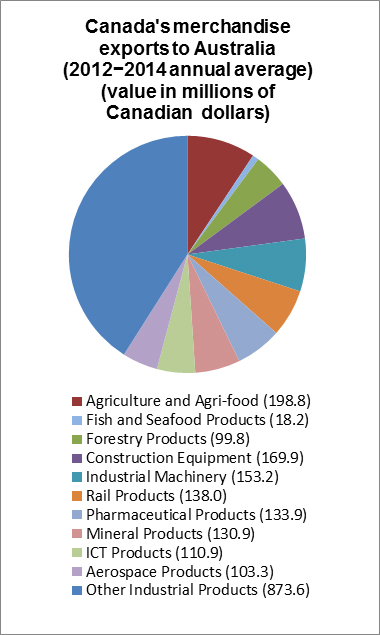Trans-Pacific Partnership (TPP) – Australia

Australia (2014)
GDP ($ billions): 1,593.4
GDP per capita ($): 67,735
GDP growth rate (%): 2.6
Consumers (millions): 23.6
Australia’s Main Imports (from the world): Mineral fuel, oil; machinery and mechanical appliances/parts; vehicles; electric machinery; pharmaceutical products

Text version
Canada's merchandise exports to Australia (2012−2014 annual average) (value in millions of Canadian dollars)
- Agriculture and Agri-food (198.8)
- Fish and Seafood Products (18.2)
- Forestry Products (99.8)
- Construction Equipment (169.9)
- Industrial Machinery (153.2)
- Rail Products (138.0)
- Pharmaceutical Products (133.9)
- Mineral Products (130.9)
- ICT Products (110.9)
- Aerospace Products (103.3)
- Other Industrial Products (873.6)
Canada has enjoyed a longstanding commercial relationship with Australia ― one that continues to grow and diversify. From 2012 to 2014, Canada exported an annual average of $2.1 billion worth of merchandise to Australia.
Preferential Access to Australia in Areas of Key interest to Canada:
Agriculture: Canada’s exports to Australia totalled $198.8 million (2012−14 average). Key interests: chocolate confectionery; whiskies; and processed foods.
Fish and Seafood: Canada’s exports to Australia totalled $18.2 million (2012−14 average). Key interests: tuna.
Wood and Other Forestry Products: Canada’s exports to Australia totalled $99.8 million (2012−14 average). Key interests: coniferous sawn wood; light-weight coated paper; wooden posts and beams.
Industrial Goods: Canada’s exports to Australia totalled $1.8 billion (2012−14 average). Key interests: diesel-electric locomotives; safety fuses; yachts, rowing boats, and canoes.
Beyond Tariffs
The TPP will help grow two-way investment between Canada and Australia, which was valued at $30.3 billion in 2014.
In addition, the TPP offers enhanced opportunities for Canada’s service industry in Australia in the areas of professional services (e.g. legal services, landscape architectural services), environmental services, transportation services and other business services (e.g. services related to manufacturing).
With regard to temporary entry of business persons, new commitments will make it easier for Canadian businesses to temporarily move certain categories of business persons to Australia. These new commitments include enhanced access for Canadian business visitors and certain highly-skilled professionals and technicians.
Furthermore, new commitments will allow spouses of certain Canadian business persons to work in Australia.
- Date Modified: